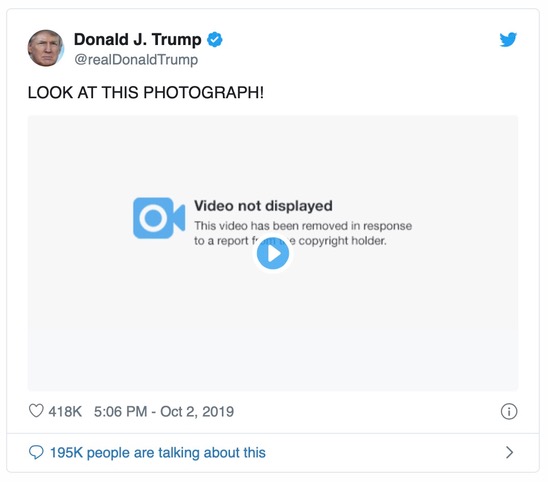
Dear Doc:
I’ve heard that politicians who use music at their campaign appearances and in their Internet postings (Tweets, Memes, and other stuff) need to get permission from the music artists, and that sometimes, they don’t. What happens then?
Signed,
Dazed and Confused
Dear D&C:
The basic rule of copyright is that unless use of a protected work is either excused as “fair use” or done with permission, then it is deemed an infringement of the exclusive rights of the copyright owner. Because the fair use exceptions do not include political campaigning, any candidate for office wanting to use a work, such as a song, should get a license from the owner. Much of the time, the owner is not the performer, but rather, is the music label, and the rights are managed by a third party such as ASCAP, BMI, and so on. Recently, we saw this in action when Donald Trump tweeted a meme that included the Nickelback song “Photograph”.

After a complaint, the video that featured the song was blocked by Twitter, as can be seen above.The copyright complaint was made by Warner Music Inc., according to information posted in the Lumen Database, a project that tracks copyright complaints.
The same requirement for a license to use music applies to public performances, such as the music played at a political rally. After his 2013 song “Happy” was used at a Trump rally in Indiana, composer Pharrell Williams issued a cease and desist letter to the campaign. Other music artists have filed similar demands of other political campaigns across the political spectrum. According to the British Newspaper, The Guardian, “Bands protesting against politicians is nothing new, but the lineup of musicians who have asked Trump to stop playing their songs alone is a Rock and Roll Hall of Fame on its own.” The Rolling Stones, REM, Adele, and Aerosmith have demanded that their music not be played by the Trump campaign.
Other musicians have used other legal strategies. Steven Tyler of Aerosmith sent a cease-and-desist of his own, objecting to the use of “Livin’ on the Edge” at a Trump campaign rally, following a similar complaint three years earlier that the campaign ignored. “By using Livin’ On The Edge without our client’s permission, Mr Trump is falsely implying that our client, once again, endorses his campaign and/or his presidency, as evidenced by actual confusion seen from the reactions of our client’s fans all over social media,” the letter said.
This specifically violates Section 43 of the Lanham Act, as it ‘is likely to cause confusion, or to cause mistake, or to deceive as to the affiliation, connection, or association of such person with another person’.” The Lanham Act is the federal trademark statute.
Often, a politician will comply with an artist’s request because the negative attention from a popular band is more trouble than continuing to play their song. But, in music, as with much else, Mr. Trump and his campaign often seems to be playing by their own rules. Trump still concludes almost every rally with the Rolling Stones’ “You Can’t Always Get What You Want”. The Doc agrees (with the song, if not with how it’s being used.)
Need to issue a cease and desist or respond to one? Call the attorneys at LW&H. They’re really experienced on both counts. You’ll almost certainly get what you want. Unless you’re sending the notice to you-know-who. Until next month,
The “Doc”
–Lawrence A. Husick, Esq.
*Originally posted on November 28, 2019

